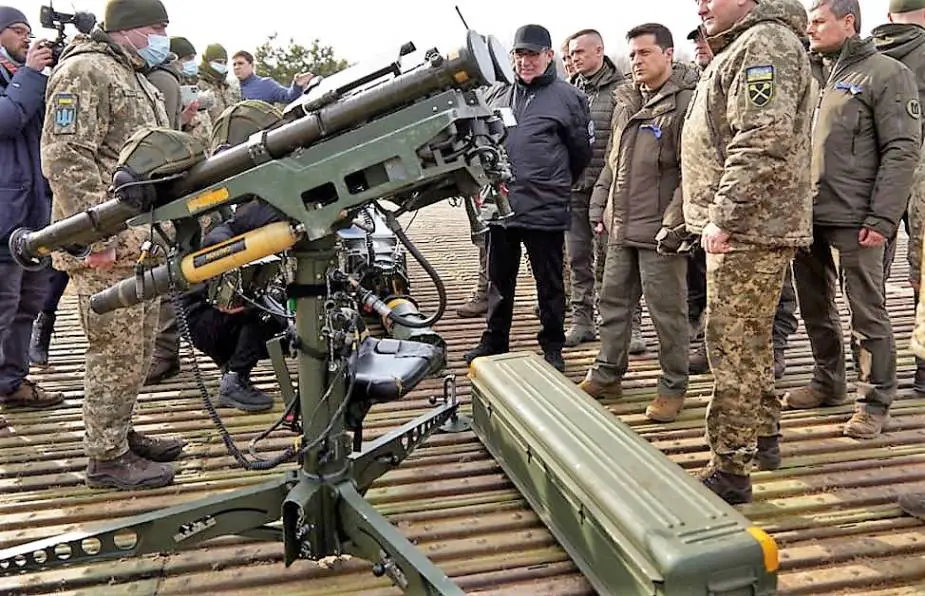Breaking news
US Department of Defense ensures accountability of weapon systems supplied to Ukraine.
As of February 28, the United States has provided $31.7 billion in support since Russia launched its invasion of Ukraine a year ago. Allies and partners have provided over $19 billion during that timeframe. "Even as we focus on getting Ukraine what it needs, we've always prioritized accountability, and Ukraine has, too. We have adapted our accountability practices for the combat environment to address the risk of illicit diversion, using mechanisms that go above and beyond our standard practices," Undersecretary of Defense for Policy Colin H. Kahl on February 28 told the House Armed Services Committee. David Vergun, U.S. DoD, reports.
Follow Army Recognition on Google News at this link

FIM-92 Stinger DMS (dual mount system) of the Ukrainian army in February 2022 (Picture source: President of Ukraine's official website)
Undersecretary of Defense for Policy Colin H. Kahl said U.S. officials have had talks with their Ukrainian counterparts for years regarding the issue of corruption and the importance of accountability and transparency. "I think there have been improvements over time, especially in the defense sector," he said.
The U.S. has provided the Ukrainians with ways to track the military systems it provides, he said. Tracking includes scanners and software, as well as remote visits to sites when conditions permit. "We don't see any evidence of diversion in our reporting," Kahl said. "We think the Ukrainians are using properly what they've been given," he said.
Defense Department Inspector General Robert P. Storch testified that within the past year, the DoD Office of Inspector General (OIG) completed five Ukraine-related oversight projects. The OIG currently has some 20 ongoing and planned audits and evaluations that are focused on, among other things, ensuring that tax dollars are used properly, that there's appropriate accountability for weapons and other material, and that U.S. stocks are appropriately replenished so they're available should they be needed elsewhere, Storch said.
Additionally, the OIG's Defense Criminal Investigative Service is actively engaged in conducting fraud prevention and investigative activities that play a critical role in ensuring the integrity of U.S. assistance to Ukraine, he said.
The OIG currently has more than 90 professionals engaged in the oversight of security assistance to Ukraine. In 2022, the office issued two management advisories that identified several areas of concern that could directly impact the DoD's ability to transparently track and report the supplemental appropriations for Ukraine, he said.
The department has long been focused on end-use monitoring and enhanced end-use monitoring, which tracks how U.S. partners employ military assistance and sensitive equipment after those assets are transferred to them, he said.
Sensitive items transferred to Ukraine and subject to enhanced end-use monitoring have bar codes with unique identifying information, such as serial numbers, said a forward-deployed U.S. official familiar with the accountability process. The Defense Department has provided the Ukrainian armed forces with a number of handheld scanners that capture the bar code information that can be transmitted later to the DoD for accountability purposes, the official said.
Ukraine is using the NATO LOGFAS logistics planning system that allows their armed forces to track equipment across units and will expand further in the coming months, the official said. LOGFAS, or Logistics Functional Area Services, is a suite of tools supporting NATO logistics processes.
Storch said that as early as 2020, OIG issued a report on how DoD was conducting enhanced end-use monitoring of military assistance to Ukraine. "In October 2022, we published a classified report that identified challenges DOD personnel responsible for EUM and EEUM face when there are limited or no U.S. personnel present and the actions the DoD was taking to address those issues in Ukraine," Storch said. "As the situation on the ground has continued to evolve, we recently initiated our third evaluation on EEUM in Ukraine, and we will continue to focus on this important area," he added.
DoD is also addressing critical issues — like the replenishment of U.S. stocks, intelligence sharing, security control for the transport of weapons and equipment, their maintenance and sustainment, awards of noncompetitive contracts and the training of Ukrainian armed forces, he said.
Storch noted that all of these oversight steps are done using a whole-of-government approach, partnering closely with a number of agencies including the State Department's OIG and the U.S. Agency for International Development's OIG.
Along with those oversight partners, the DoD OIG established and leads the Ukraine Oversight Interagency Working Group, which brings together 20 oversight entities, he said. "The DoD OIG, working hand in glove with our oversight partners, will continue to make independent oversight of assistance to Ukraine a matter of the highest priority. And we will continue to keep the Congress and the public informed about our work," he said.
Army Lt. Gen. Douglas A. Sims II, the Joint Staff's director for operations, thanked the committee and Congress for providing oversight and resources in support of Ukraine.
Army Recognition’s comment: needless to say that ensuring as far as possible that no weapons delivered by Western allies to Ukraine arrive on the black market because of corrupt officials is a major concern, mainly regarding the small arms, portable anti-tank and air defense weapons.
Defense News March 2023


























